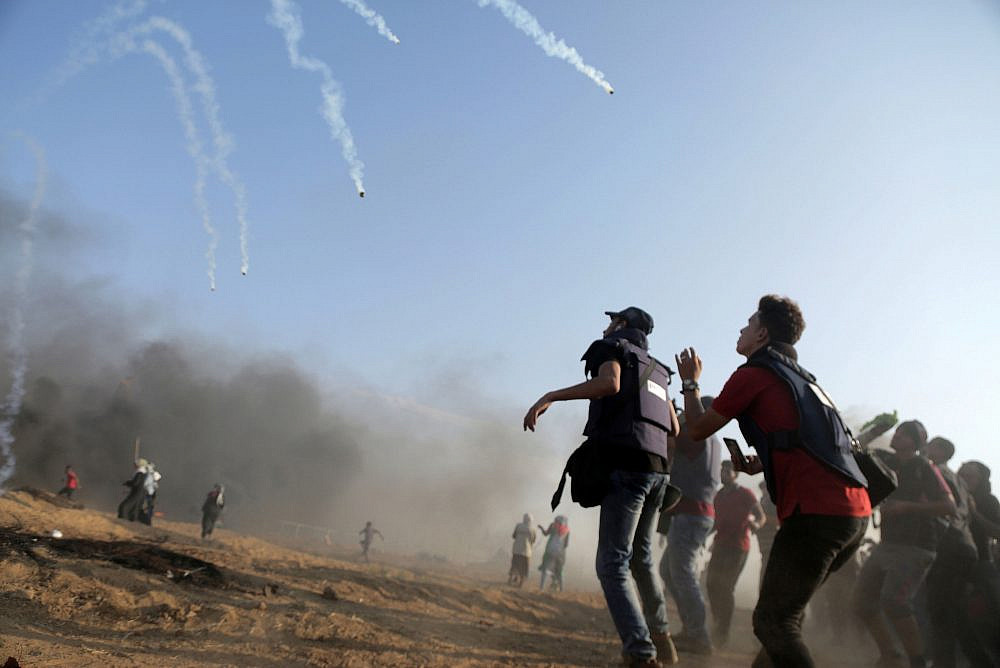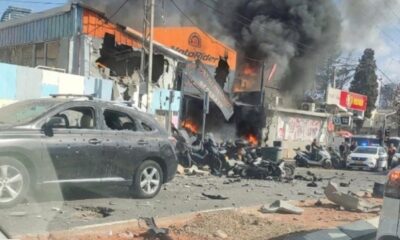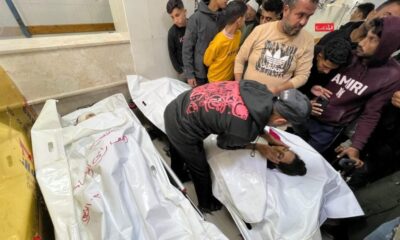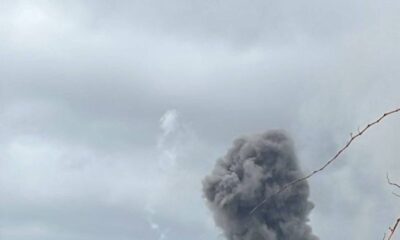Featured
‘Press vests won’t keep you safe’: Journalists recount Israeli army attacks

The first time I experienced the violence of Israeli forces as a journalist was shortly after I returned from the United States in 2014, where I had spent a few years studying and working in the media. A documentary filmmaker asked me to help him cover the annual Nakba Day protest in Bethlehem. By then, I had already worked in the occupied West Bank, but never in Bethlehem, where Israeli forces are known for using excessive force from a close range.
There are snippets from that day that I not only still remember, but feel like I relive even on a physical level, no matter how much therapy or healing I do. I remember the moment the Israeli soldiers charged at the journalists. We were all bundled together in one corner to the side of the soldiers and protesters, dressed in full protective gear.
Our helmets and vests were clearly labeled “press.” From this, and the fact that we were holding cameras and microphones, there was no way to mistake that we were journalists. Nor were there any protesters near us.
Yet suddenly, the soldiers charged at us, shoving us and screaming at us to leave the scene. Before we even had a chance to move, they fired stun grenades and tear gas. The sounds were deafening, and the air burned.
As I struggled to put on my gas mask, one of the soldiers came right up to me and screamed in my face. He then sandwiched me between his rifle and a nearby wall while bellowing in my ear to move. Luckily, the American filmmaker I was with intervened and told the soldier we were leaving. I still had my eyes shut, and I remember thinking the way I used to when I was a child — that if I don’t lock eyes with the monsters (which, back then, were imaginary and hiding under my bed), they cannot kill me.
As soon as I put on the gas mask, I saw the soldiers shove another journalist. He did not scream or cry like me; he kept hugging his camera and raising it in the air to protect it. In the end, they detained him. It was the first time I saw the army detain a journalist in front of my eyes. I wanted to save him, to go and scream at the soldiers to leave us alone, but I was too terrified to say anything.
Israeli forces routinely attack, arrest, and sometimes even kill Palestinian journalists simply for doing their job. According to the Palestinian Journalists’ Union, as many as 55 Palestinian journalists have been killed by Israeli forces since the year 2000. Since the start of 2022, the Palestinian Center for Development and Media Freedoms (MADA) recorded 215 attacks on Palestinian journalists by Israeli forces. Meanwhile, according to the Palestinian Prisoners’ Society, 15 Palestinian journalists are currently sitting in Israeli prisons, including one in administrative detention.
On top of the physical traumas we sometimes face, we also have to constantly endure the emotional trauma of witnessing and documenting the oppression of our people, and our colleagues, at the hands of occupying forces. The killing of Shireen Abu Akleh earlier this month has resurfaced that collective trauma for all of us.
Following Shireen’s killing, +972 Magazine spoke to three journalists from the Gaza Strip and the West Bank to shine a light on their experiences of working in the field while under occupation and siege. Here are their stories.
‘I felt like a missile hit me’
Mo’ath Amarnih is a photojournalist who has been taking photos since he was 10 years old. In November 2019, while covering a protest against land confiscation in Khirbet Safa, a few miles north of Hebron, Amarnih was shot in the face with a rubber bullet and lost his eye from the damage.
“On that day, the brutalization was monstrous,” he tells +972. “As soon as people started gathering, the army began firing dozens of tear gas grenades. Then there was a period of calm, but my gut told me something worse was going to happen.”
Amarnih was filming from a position behind a dirt pile which hid his lower body, and was wearing a press vest and helmet. “I thought this would protect me from their bullets,” he says. But it wasn’t enough.
“When you are hit with a bullet, you do not hear its sound,” says Amarnih. “I felt like a missile hit me and my head was blown away. I did not comprehend what was happening to me. I was unconscious, and for a few seconds my whole life flashed in front of my eyes. I did not know if I was alive or dead.”
According to Amarnih, the army did not provide any medical care after he was shot. Instead, soldiers came and took photos of him, while help came from other journalists on the scene. Later, when his lawyer asked the police about the results of their investigation into the incident, they told him that the army concluded that the bullet was not theirs.
“Until today I still cannot believe that I survived,” he continues. “I still live with the bullet in my head. They shot me in the eye — the most important part of my body for my work.”
For several years after the incident, Amarnih was physically unable to return to taking photographs. “When I focused my seeing eye on the lens of the camera, I would fall into holes in the ground,” he says. He also encountered an emotional block: “Every time I would look into the lens, a flashback would take me back to the moment I was shot.”
Amarnih says he received the emotional support he needed after the incident from his family and his colleagues, who were also traumatized by what they had witnessed. But the trauma still resurfaces, as it did after the recent killing of Shireen Abu Akleh. “I saw myself in her killing,” says Amarnih. “I did not comprehend that it was her funeral — I felt like it was me being carried in her casket. I thought they were burying me.”
On reflection, Amarnih sees this incident as part of a pattern. “When there are no clashes, the army attacks journalists,” he says. “They go crazy as if they have seen the devil. We sometimes prefer not to wear press vests, since we do not want them to recognize and target us. They suppress us because our photos prove to the world that they are a criminal army. We want the whole world to know how much we suffer to show them the whole picture. We need international protection. We want the world to hold Israel accountable for its attacks on us.”
‘I heard them laugh, saying “I got him”’
Mohammad al-Azza was born in Aida Refugee Camp next to Bethlehem, where he lives today. In 2013, he was working as the communications director at a youth center in the camp, documenting life in the camp through photos and videos, when he heard gunfire outside. He immediately picked up his camera.
“I saw a bunch of soldiers who came down from their base standing 150 meters away from the entrance to Aida,” he tells +972. “I went out to the balcony on the second floor and started taking photos. I was alone.”
As the soldiers continued approaching the entrance of the camp, they fired tear gas, sound bombs, and rubber bullets at a group of Palestinian youth who were trying to resist their entry. Then, al-Azza saw the commander of the army unit point at him while talking on the phone.
“Usually when the military raid the camp they would yell at me to leave the scene, curse at me, or fire stun grenades and tear gas toward me,” he says. “That day, they did not mess with me. It was weird but I kept taking photos, especially of the commander who spent time focusing his rifle then firing toward the kids.”
At a certain point, the soldiers yelled at al-Azza to go home, so he started leaving the balcony. But suddenly, out of the corner of his eye, he noticed a fire spark and realized immediately that it was coming from the rifle of one of the soldiers. The rubber-coated bullet hit Mohammad in the face, on his right cheek.
“I screamed so loud,” he says. “I heard the soldiers and the commander laugh, saying ‘I got him.’ My face was covered in blood, and the friend who came to help me freaked out when he saw.”
Because the army had blockaded the camp, the ambulance was unable to reach al-Azza. “I walked with my friend, bleeding heavily. The soldiers told us to stop but we kept walking toward my house, and they started firing tear gas canisters at us.” Al-Azza’s neighbor took him in his car to the hospital, using a back road to avoid the soldiers.
“All the bones on the right side of my face were fractured, and my eye fell because the bones surrounding it were not holding it anymore,” al-Azza continues. “I was in surgery for nine hours. They took bones from my hip and planted them in my face, and they also used platinum in place of the facial bones that were shattered.”
The army accused al-Azza of throwing stones at the soldiers, and the Israeli media parroted the army’s claims. But al-Azza had taken photographs of the commander, so he decided to sue him. “The army started asking every single person they arrested from the camp about me in an attempt to accuse me of something, to counter my lawsuit,” he says.
After spending two weeks sleeping at two different hospitals, and 10 hours in operations, al-Azza was allowed to go home and continue visiting the doctors for further medical care. The first night after he was released from the hospital, though, the army raided his house. They broke the door down and destroyed everything in the house, before threatening his mom: “If he doesn’t come to us, we will bring him back to you dead.”
Al-Azza was not at home that night, nor did he return home for the next several weeks in order to avoid the army and to continue his medical treatment. “They kept breaking into our house and beating up my family,” he says. “One time, they detained my father and brother and made them call me to turn myself in, but I refused.”
‘When the camera is present, they panic’
After two exhausting months of living away from home, al-Azza decided to go back. The army immediately raided his house. “They started beating me up,” he recalls. “I begged them not to hit me in the face, but they deliberately struck me on my injury. Blood started running down my neck and chest.
“They took me to Etzion interrogation center; I was wearing my shorts and they refused to let me change or put on shoes, or to receive medical care,” al-Azza continues. After four days in detention, the army started interrogating him and tried to force him to sign a confession, which he refused to do.
Eventually, the army took al-Azza to a hospital in Jerusalem so that he could be examined by an eye doctor. Before long, however, he realized the real reason they had brought him there: they wanted a doctor’s opinion that would counter al-Azza’s lawsuit, in which he stated how his sight had been affected by the injury. “I kept asking the doctor what exams he was doing and he did not answer me,” al-Azza explains. “Israeli forces were present with us in the room. I’m sure they had an agreement.”
After that, the soldiers returned him to Ofer detention center where he spent 10 more days before being released on bail. He continued to pursue his lawsuit against the army.
“Every month for three years I went to Ofer for yet another court session in my case,” he continues. “The Israeli authorities banned me from traveling to the United States for facial reconstruction surgery and kept trying to force me to drop the case — including by making up a bunch of allegations against me. My case is still at the High Court. I do not know where it stands today.”
Like Amarnih, al-Azza sees a pattern in the way Israeli forces target Palestinian journalists at protests. “The soldiers always target the journalists first with [sound and tear gas] bombs and yell at us to leave so they can operate freely,” he says. “When the camera is present, they panic. They do not want the world to see [what they’re doing].”
When I ask him why he keeps going back out into the field despite the risk of injury or even death as a Palestinian journalist, he responds that it is his duty to continue. “The Israelis worry about their image, so they try to stop Palestinians from documenting their crimes,” he says. “They want to decide the narrative and to appear powerful and humane, when in reality it is the exact opposite.
“The army raided my refugee camp every day and confiscated my footage, and once broke my camera,” he continues. “But I never thought I would be targeted deliberately — perhaps only injured by mistake. I was very lucky to live because by shooting me in the face they intended to kill me. But I am not scared; on the contrary, I feel like I have nothing to lose.”
‘My life could have ended in seconds’
Youmna al-Sayed works as Al Jazeera’s English-language correspondent in the besieged Gaza Strip. She is originally from Egypt and was born in South Africa, where she spent most of her life before marrying a Palestinian from Gaza and moving with him to the strip. They have four children between the ages of four and eleven.
Al-Sayed had already become accustomed to Israeli soldiers firing stun grenades — and often live fire — at journalists while covering demonstrations at the Israel-Gaza fence, particularly during the Great March of Return. But the events of May 2021, and in particular Israel’s aerial attacks on the strip during that month, were beyond anything she could imagine. During those days, she tells +972, “no place was safe.”
She remembers sitting in her car when Israeli forces bombed another vehicle just meters away. “My life could have ended in seconds,” says al-Sayed. “Our car hit the sidewalk from the impact of the missile, and I had bruises from hitting my head on the dashboard. I didn’t feel any pain because I was too shocked to understand what just happened. The driver spoke to me and started shaking me, but I couldn’t hear his voice. I just felt like I could see my kids in front of my eyes.”
Shortly thereafter, paramedics arrived at the scene and al-Sayed found herself in Al-Shifa hospital — a location she knew well from reporting, but where she was now a patient. “I carried on after that incident, but I won’t lie to you if I tell you that I can still feel the same feelings of shock from that day until today.”
To prepare for any possibility of violence, al-Sayed says that she and her colleagues make sure they wear protective gear every single time they report, although that doesn’t help much in the face of Israeli bombings. “We try everything that shows who we are and why we shouldn’t be targeted. But journalists can be targeted at any time, anywhere, with press vests and helmets — none of that will keep you safe. It doesn’t matter if you’re not Palestinian: if you’re a journalist covering Gaza, you’re a possible target.”
The solution, she believes, is to hold Israel accountable for its crimes against journalists “who are only messengers, just like the international community would do with any [other] country that targets journalists. Only then will Israel be deterred.”
Source: +972 Magazine










